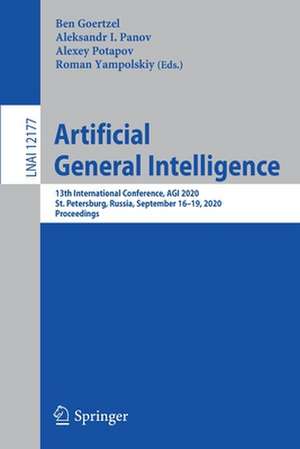Artificial General Intelligence: 13th International Conference, AGI 2020, St. Petersburg, Russia, September 16–19, 2020, Proceedings: Lecture Notes in Computer Science, cartea 12177
Editat de Ben Goertzel, Aleksandr I. Panov, Alexey Potapov, Roman Yampolskiyen Limba Engleză Paperback – 7 iul 2020
Din seria Lecture Notes in Computer Science
- 20%
 Preț: 1061.55 lei
Preț: 1061.55 lei - 20%
 Preț: 307.71 lei
Preț: 307.71 lei - 20%
 Preț: 438.69 lei
Preț: 438.69 lei - 20%
 Preț: 579.30 lei
Preț: 579.30 lei -
 Preț: 410.88 lei
Preț: 410.88 lei - 17%
 Preț: 427.22 lei
Preț: 427.22 lei - 20%
 Preț: 596.46 lei
Preț: 596.46 lei - 15%
 Preț: 448.04 lei
Preț: 448.04 lei - 20%
 Preț: 353.50 lei
Preț: 353.50 lei -
 Preț: 389.49 lei
Preț: 389.49 lei - 20%
 Preț: 309.90 lei
Preț: 309.90 lei - 20%
 Preț: 645.28 lei
Preț: 645.28 lei - 20%
 Preț: 763.23 lei
Preț: 763.23 lei - 15%
 Preț: 580.46 lei
Preț: 580.46 lei - 20%
 Preț: 310.28 lei
Preț: 310.28 lei - 20%
 Preț: 655.02 lei
Preț: 655.02 lei - 20%
 Preț: 1183.14 lei
Preț: 1183.14 lei - 20%
 Preț: 340.32 lei
Preț: 340.32 lei -
 Preț: 449.57 lei
Preț: 449.57 lei - 20%
 Preț: 591.51 lei
Preț: 591.51 lei - 18%
 Preț: 938.83 lei
Preț: 938.83 lei - 20%
 Preț: 337.00 lei
Preț: 337.00 lei - 20%
 Preț: 649.50 lei
Preț: 649.50 lei - 20%
 Preț: 607.40 lei
Preț: 607.40 lei - 20%
 Preț: 1414.79 lei
Preț: 1414.79 lei - 20%
 Preț: 1024.44 lei
Preț: 1024.44 lei - 20%
 Preț: 583.40 lei
Preț: 583.40 lei - 20%
 Preț: 453.32 lei
Preț: 453.32 lei - 20%
 Preț: 575.49 lei
Preț: 575.49 lei - 20%
 Preț: 1075.26 lei
Preț: 1075.26 lei - 20%
 Preț: 585.88 lei
Preț: 585.88 lei - 20%
 Preț: 825.93 lei
Preț: 825.93 lei - 17%
 Preț: 360.20 lei
Preț: 360.20 lei - 20%
 Preț: 763.23 lei
Preț: 763.23 lei - 20%
 Preț: 340.32 lei
Preț: 340.32 lei - 20%
 Preț: 504.58 lei
Preț: 504.58 lei - 20%
 Preț: 369.13 lei
Preț: 369.13 lei - 20%
 Preț: 580.93 lei
Preț: 580.93 lei - 20%
 Preț: 343.62 lei
Preț: 343.62 lei - 20%
 Preț: 350.21 lei
Preț: 350.21 lei - 20%
 Preț: 583.40 lei
Preț: 583.40 lei - 20%
 Preț: 583.40 lei
Preț: 583.40 lei - 15%
 Preț: 438.59 lei
Preț: 438.59 lei - 20%
 Preț: 341.95 lei
Preț: 341.95 lei - 20%
 Preț: 238.01 lei
Preț: 238.01 lei - 20%
 Preț: 538.30 lei
Preț: 538.30 lei
Preț: 593.01 lei
Preț vechi: 741.26 lei
-20% Nou
Puncte Express: 890
Preț estimativ în valută:
113.51€ • 123.34$ • 95.41£
113.51€ • 123.34$ • 95.41£
Carte tipărită la comandă
Livrare economică 21 aprilie-05 mai
Preluare comenzi: 021 569.72.76
Specificații
ISBN-13: 9783030521516
ISBN-10: 3030521516
Pagini: 200
Ilustrații: XI, 372 p. 91 illus., 39 illus. in color.
Dimensiuni: 155 x 235 mm
Greutate: 0.54 kg
Ediția:1st ed. 2020
Editura: Springer International Publishing
Colecția Springer
Seriile Lecture Notes in Computer Science, Lecture Notes in Artificial Intelligence
Locul publicării:Cham, Switzerland
ISBN-10: 3030521516
Pagini: 200
Ilustrații: XI, 372 p. 91 illus., 39 illus. in color.
Dimensiuni: 155 x 235 mm
Greutate: 0.54 kg
Ediția:1st ed. 2020
Editura: Springer International Publishing
Colecția Springer
Seriile Lecture Notes in Computer Science, Lecture Notes in Artificial Intelligence
Locul publicării:Cham, Switzerland
Cuprins
AGI and the Knight-Darwin Law: why idealized AGI reproduction requires collaboration.- Error-Correction for AI Safety.- Artificial Creativity Augmentation.- The hierarchical memory based on compartmental spiking neuron model.- The Dynamics of Growing Symbols: A Ludics Approach to Language Design by Autonomous Agents.- Approach for development of engineering tools based on knowledge graphs and context separation.- Towards Dynamic Process Composition in the DSO Cognitive Architecture.- SAGE: Task-Environment Platform for Evaluating a Broad Range of AI Learners.- Post-Turing Methodology: Breaking the Wall on the Way to Artificial General Intelligence.- Self-explaining AI as an alternative to interpretable AI.- AGI needs the Humanities.- A report of a recent book: "AI and Human Thought and Emotion".- Cognitive Machinery and Behaviours.- Combinatorial Decision Dags: A Natural Computational Model for General Intelligence.- What Kind of Programming Language Best Suits Integrative AGI?.- Guiding Symbolic Natural Language Grammar Induction via Transformer-Based Sequence Probabilities.- Embedding Vector Differences Can Be Aligned With Uncertain Intensional Logic Differences.- Delta Schema Network in Model-based Reinforcement Learning.- Information Digital Twin{Enabling Agents to Anticipate Changes in their Tasks.- ‘OpenNARS for Applications’: Architecture and Control.- Towards AGI Agent Safety by Iteratively Improving the Utility Function.- Learning to Model Another Agent's Beliefs: A Preliminary Approach.- An Attentional Control Mechanism for Reasoning and Learning.- Hyperdimensional Representations in Semiotic Approach to AGI.- The Conditions of Artificial General Intelligence: Logic, Autonomy, Resilience, Integrity, Morality, Emotion, Embodiment, and Embeddedness.- Position paper: The use of engineering approach in creation of artificial general intelligence.- How do you test the strength of AI?.- Omega: An Architecture for AI Unification.- Analyzing Elementary School Olympiad Math Tasks as a Benchmark for AGI.- The meaning of things as a concept in a strong AI architecture.- Toward a General Believable Model of Human-Analogous Intelligent Socially Emotional Behavior.- Autonomous Cumulative Transfer Learning.- New Brain Simulator II Open-Source Software.- Experience-specific AGI Paradigms.- Psychological portrait of a virtual agent in the Teleport game paradigm.- Logical probabilistic biologically inspired cognitive architecture.- An Architecture for Real-time Reasoning and Learning.- A Model for Artificial General Intelligence.
